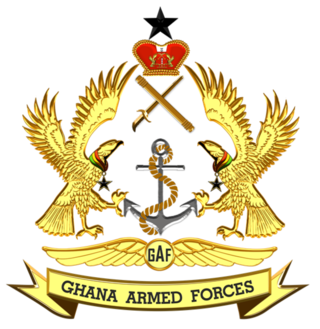
The Ghana Armed Forces (GAF) is the unified armed force of Ghana, consisting of the Army (GA), Navy (GN), and Ghana Air Force.
Overtime is the amount of time someone works beyond normal working hours. The term is also used for the pay received for this time. Normal hours may be determined in several ways:

A salary is a form of periodic payment from an employer to an employee, which may be specified in an employment contract. It is contrasted with piece wages, where each job, hour or other unit is paid separately, rather than on a periodic basis. Salary can also be considered as the cost of hiring and keeping human resources for corporate operations, and is hence referred to as personnel expense or salary expense. In accounting, salaries are recorded in payroll accounts.
Equal pay for equal work is the concept of labour rights that individuals in the same workplace be given equal pay. It is most commonly used in the context of sexual discrimination, in relation to the gender pay gap. Equal pay relates to the full range of payments and benefits, including basic pay, non-salary payments, bonuses and allowances. Some countries have moved faster than others in addressing equal pay.
Japanese labour law is the system of labour law operating in Japan.
Trade unions in Ghana first emerged in the 1920s and have played an important role in the country's economy and politics ever since.

The United States postal strike of 1970 was an eight-day strike by federal postal workers in March 1970. The strike began in New York City and spread to some other cities in the following two weeks. This strike against the federal government, regarded as illegal, was the largest wildcat strike in U.S. history.
Minimum wage law is the body of law which prohibits employers from hiring employees or workers for less than a given hourly, daily or monthly minimum wage. More than 90% of all countries have some kind of minimum wage legislation.
The history of minimum wage is about the attempts and measures governments have made to introduce a standard amount of periodic pay below which employers could not compensate their workers.

The Fair Labor Standards Act of 1938 29 U.S.C. § 203 (FLSA) is a United States labor law that creates the right to a minimum wage, and "time-and-a-half" overtime pay when people work over forty hours a week. It also prohibits employment of minors in "oppressive child labor". It applies to employees engaged in interstate commerce or employed by an enterprise engaged in commerce or in the production of goods for commerce, unless the employer can claim an exemption from coverage. The Act was enacted by the 75th Congress and signed into law by President Franklin D. Roosevelt in 1938.

The Ministry of Education (MOE) is a multiportfolio government ministry of Ghana, responsible for the governance and management of Ghana's education. It is responsible for the national education curriculum, primarily instituted by Ghana Education Service, which is part of the Ministry.

Indian labour law refers to law regulating labour in India. Traditionally, the Indian government at the federal and state levels has sought to ensure a high degree of protection for workers, but in practice, this differs due to the form of government and because labour is a subject in the concurrent list of the Indian Constitution. The Minimum Wages Act 1948 requires companies to pay the minimum wage set by the government alongside limiting working weeks to 40 hours. Overtime is strongly discouraged with the premium on overtime being 100% of the total wage. The Payment of Wages Act 1936 mandates the payment of wages on time on the last working day of every month via bank transfer or postal service. The Factories Act 1948 and the Shops and Establishment Act 1960 mandate 15 working days of fully paid vacation leave each year to each employee with an additional 7 fully paid sick days. The Maternity Benefit (Amendment) Act, 2017 gives female employees of every company the right to take 6 months' worth of fully paid maternity leave. It also provides for 6 weeks worth of paid leaves in case of miscarriage or medical termination of pregnancy. The Employees' Provident Fund Organisation and the Employees' State Insurance, governed by statutory acts provide workers with necessary social security for retirement benefits and medical and unemployment benefits respectively. Workers entitled to be covered under the Employees' State Insurance are also entitled to 90 days worth of paid medical leaves. A contract of employment can always provide for more rights than the statutory minimum set rights. The Indian parliament passed four labour codes in the 2019 and 2020 sessions. These four codes will consolidate 44 existing labour laws. They are: The Industrial Relations Code 2020, The Code on Social Security 2020, The Occupational Safety, Health and Working Conditions Code, 2020 and The Code on Wages 2019.

The Council for Scientific and Industrial Research (CSIR) was established by NLC Decree 293 of October 10, 1968 amended by NLCD 329 of 1969, and re-established in its present form by CSIR Act 521 on November 26, 1996. The genesis of the council however, dates back to the erstwhile National Research Council (NRC), which was established by the government in August 1958 to organize and coordinate scientific research in Ghana. In 1963, the NRC merged with the former Ghana Academy of Sciences, a statutory learned society. Following a review in 1966, the academy was reconstituted into, essentially, its original component bodies, namely a national research organization redesignated the CSIR and a learned Society, designated the Ghana Academy of Arts and Sciences.
Trade unions in Costa Rica advocate for the rights of workers in Costa Rica. Dating back to the late 1800s, labor unions in the country have been a political force. They remain active in political and social life for many Costa Ricans.
The National War Labor Board, commonly the War Labor Board, was an independent agency of the United States government, established January 12, 1942, by an executive order of President Franklin D. Roosevelt, the purpose of which was to mediate labor disputes as part of the American home front during World War II.

Emmanuel Earl Ankrah professionally known as Earl Ankrah is a Ghanaian former national television show host; and currently a policy communications practitioner.

The Government of Ghana initially responded to the virus through a nationwide disinfection and fumigation exercise which began in April 2020. In order to curb the spread of the virus, the government enforced lockdowns, aggressive contact tracing, public bans and social measures such as encouraging the wearing of face masks. By April, it began the gradual reopening of the country; lifting all lockdowns while maintaining protocols such as social distancing. Throughout the pandemic, the government partnered with the private sector in order to roll out economic reliefs and recovery programs as a result of the impact of the pandemic on Ghana's economy. There was also an expansion of medical facilities and the improvement of testing logistics.
Kissi Agyebeng is a Ghanaian lawyer, academic, and the Special Prosecutor of Ghana as of 2021. Prior to his appointment, he was a lecturer at the University of Ghana, Managing Partner at Cromwellgray LLP, and the Chairman of the Electronic Communications Tribunal of Ghana.
The University Teachers Association of Ghana (UTAG) called on its members to engage in an indefinite strike on January 10, 2022. The UTAG stated that this action is due to "worsening conditions of service" without sufficient response from the employer.









